Context of Business: Micro and Macro Factors Analysis and Report
VerifiedAdded on 2020/11/12
|13
|4458
|77
Report
AI Summary
This report delves into the context of business, examining both micro and macro environmental factors that shape modern business operations. It explores the importance of ethical behavior for individuals and organizations, with a specific focus on sustainable development and various dimensions of sustainability including social, cultural, economic, and environmental aspects. The report includes a case study on Tesco, a multinational retailer, analyzing its business history, mission, objectives, leadership styles, management practices, and strategic approaches. Furthermore, the report presents recommendations for improvement. The analysis covers a range of factors influencing business success, providing a comprehensive overview of the business environment and ethical considerations within the industry.
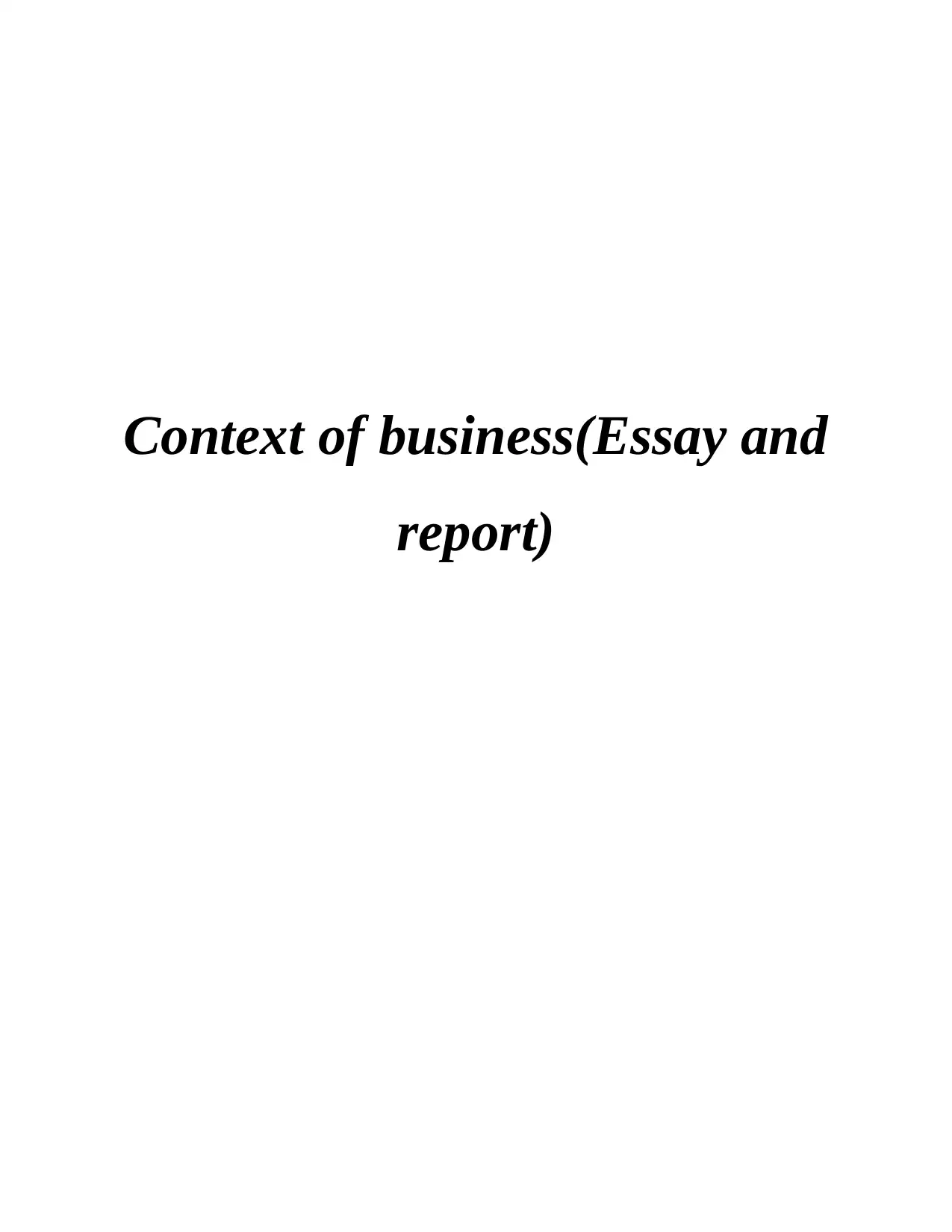
Context of business(Essay and
report)
report)
Paraphrase This Document
Need a fresh take? Get an instant paraphrase of this document with our AI Paraphraser
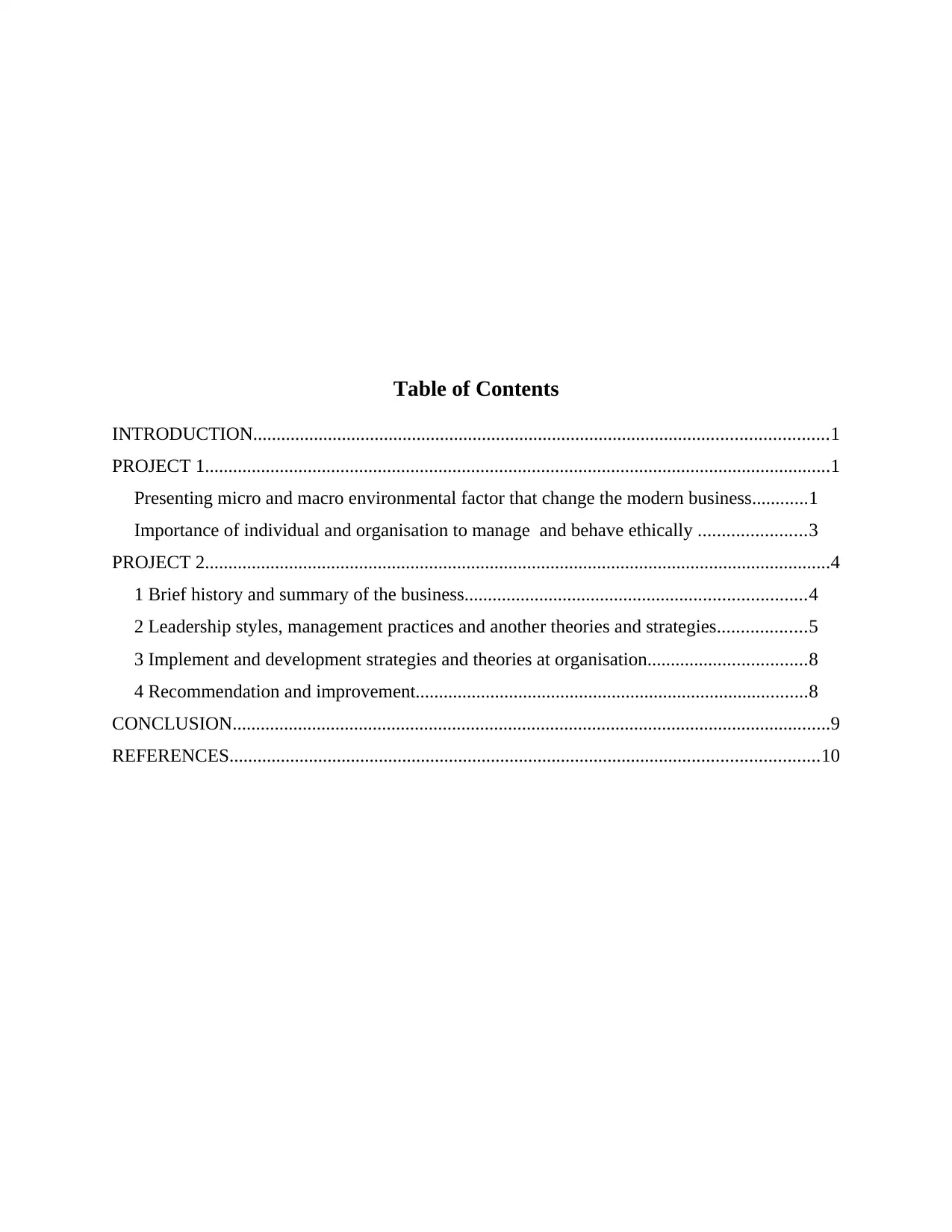
Table of Contents
INTRODUCTION...........................................................................................................................1
PROJECT 1......................................................................................................................................1
Presenting micro and macro environmental factor that change the modern business............1
Importance of individual and organisation to manage and behave ethically .......................3
PROJECT 2......................................................................................................................................4
1 Brief history and summary of the business.........................................................................4
2 Leadership styles, management practices and another theories and strategies...................5
3 Implement and development strategies and theories at organisation..................................8
4 Recommendation and improvement....................................................................................8
CONCLUSION................................................................................................................................9
REFERENCES..............................................................................................................................10
INTRODUCTION...........................................................................................................................1
PROJECT 1......................................................................................................................................1
Presenting micro and macro environmental factor that change the modern business............1
Importance of individual and organisation to manage and behave ethically .......................3
PROJECT 2......................................................................................................................................4
1 Brief history and summary of the business.........................................................................4
2 Leadership styles, management practices and another theories and strategies...................5
3 Implement and development strategies and theories at organisation..................................8
4 Recommendation and improvement....................................................................................8
CONCLUSION................................................................................................................................9
REFERENCES..............................................................................................................................10
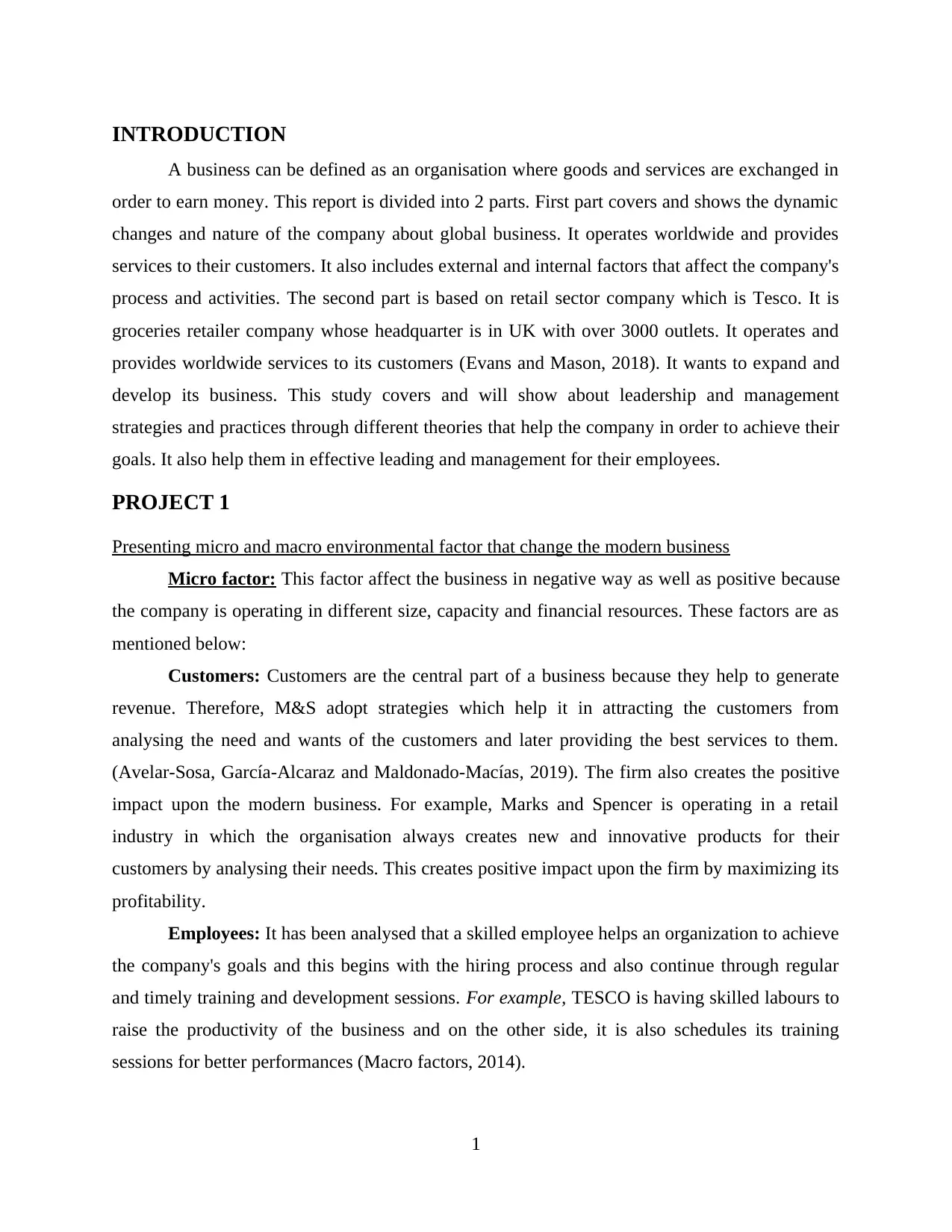
INTRODUCTION
A business can be defined as an organisation where goods and services are exchanged in
order to earn money. This report is divided into 2 parts. First part covers and shows the dynamic
changes and nature of the company about global business. It operates worldwide and provides
services to their customers. It also includes external and internal factors that affect the company's
process and activities. The second part is based on retail sector company which is Tesco. It is
groceries retailer company whose headquarter is in UK with over 3000 outlets. It operates and
provides worldwide services to its customers (Evans and Mason, 2018). It wants to expand and
develop its business. This study covers and will show about leadership and management
strategies and practices through different theories that help the company in order to achieve their
goals. It also help them in effective leading and management for their employees.
PROJECT 1
Presenting micro and macro environmental factor that change the modern business
Micro factor: This factor affect the business in negative way as well as positive because
the company is operating in different size, capacity and financial resources. These factors are as
mentioned below:
Customers: Customers are the central part of a business because they help to generate
revenue. Therefore, M&S adopt strategies which help it in attracting the customers from
analysing the need and wants of the customers and later providing the best services to them.
(Avelar-Sosa, García-Alcaraz and Maldonado-Macías, 2019). The firm also creates the positive
impact upon the modern business. For example, Marks and Spencer is operating in a retail
industry in which the organisation always creates new and innovative products for their
customers by analysing their needs. This creates positive impact upon the firm by maximizing its
profitability.
Employees: It has been analysed that a skilled employee helps an organization to achieve
the company's goals and this begins with the hiring process and also continue through regular
and timely training and development sessions. For example, TESCO is having skilled labours to
raise the productivity of the business and on the other side, it is also schedules its training
sessions for better performances (Macro factors, 2014).
1
A business can be defined as an organisation where goods and services are exchanged in
order to earn money. This report is divided into 2 parts. First part covers and shows the dynamic
changes and nature of the company about global business. It operates worldwide and provides
services to their customers. It also includes external and internal factors that affect the company's
process and activities. The second part is based on retail sector company which is Tesco. It is
groceries retailer company whose headquarter is in UK with over 3000 outlets. It operates and
provides worldwide services to its customers (Evans and Mason, 2018). It wants to expand and
develop its business. This study covers and will show about leadership and management
strategies and practices through different theories that help the company in order to achieve their
goals. It also help them in effective leading and management for their employees.
PROJECT 1
Presenting micro and macro environmental factor that change the modern business
Micro factor: This factor affect the business in negative way as well as positive because
the company is operating in different size, capacity and financial resources. These factors are as
mentioned below:
Customers: Customers are the central part of a business because they help to generate
revenue. Therefore, M&S adopt strategies which help it in attracting the customers from
analysing the need and wants of the customers and later providing the best services to them.
(Avelar-Sosa, García-Alcaraz and Maldonado-Macías, 2019). The firm also creates the positive
impact upon the modern business. For example, Marks and Spencer is operating in a retail
industry in which the organisation always creates new and innovative products for their
customers by analysing their needs. This creates positive impact upon the firm by maximizing its
profitability.
Employees: It has been analysed that a skilled employee helps an organization to achieve
the company's goals and this begins with the hiring process and also continue through regular
and timely training and development sessions. For example, TESCO is having skilled labours to
raise the productivity of the business and on the other side, it is also schedules its training
sessions for better performances (Macro factors, 2014).
1
⊘ This is a preview!⊘
Do you want full access?
Subscribe today to unlock all pages.

Trusted by 1+ million students worldwide
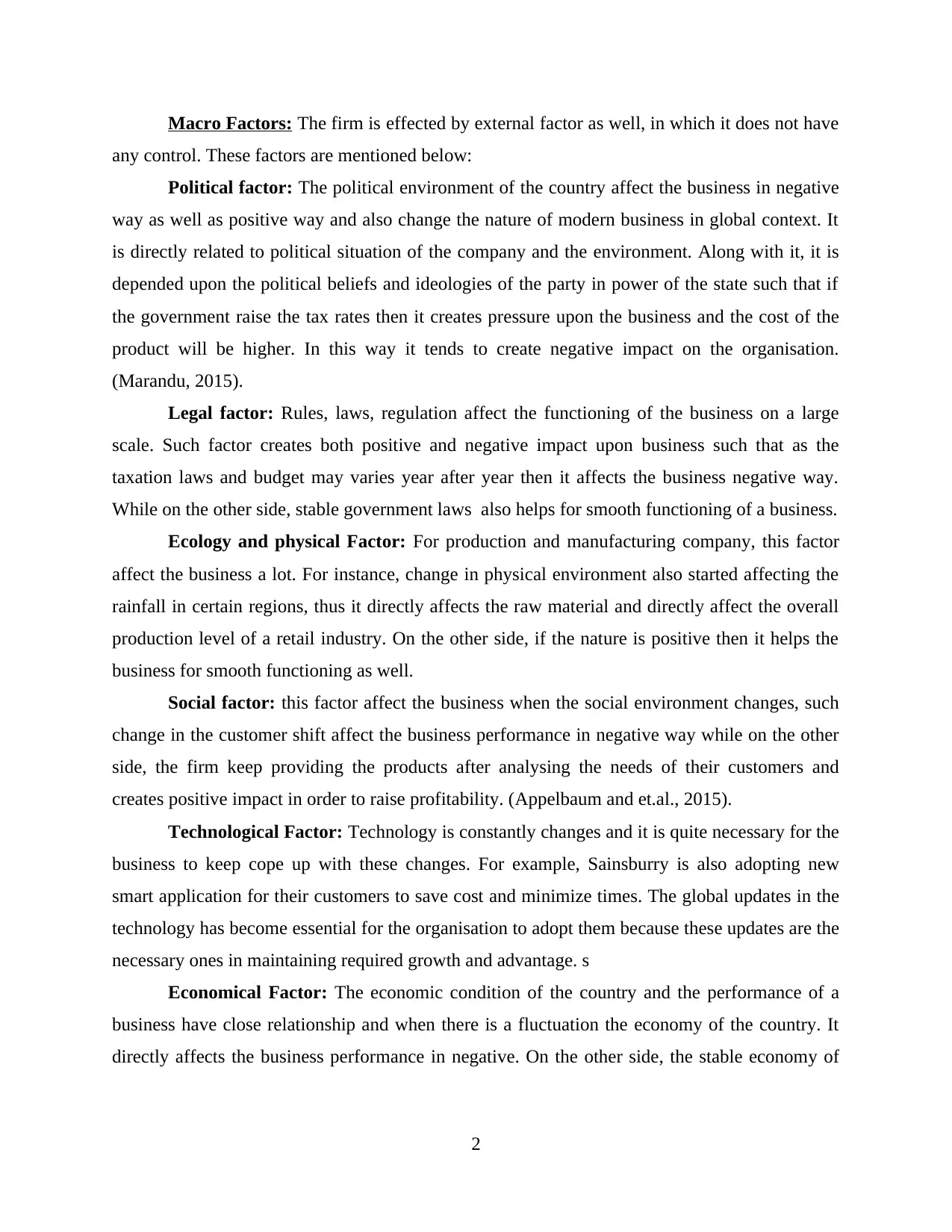
Macro Factors: The firm is effected by external factor as well, in which it does not have
any control. These factors are mentioned below:
Political factor: The political environment of the country affect the business in negative
way as well as positive way and also change the nature of modern business in global context. It
is directly related to political situation of the company and the environment. Along with it, it is
depended upon the political beliefs and ideologies of the party in power of the state such that if
the government raise the tax rates then it creates pressure upon the business and the cost of the
product will be higher. In this way it tends to create negative impact on the organisation.
(Marandu, 2015).
Legal factor: Rules, laws, regulation affect the functioning of the business on a large
scale. Such factor creates both positive and negative impact upon business such that as the
taxation laws and budget may varies year after year then it affects the business negative way.
While on the other side, stable government laws also helps for smooth functioning of a business.
Ecology and physical Factor: For production and manufacturing company, this factor
affect the business a lot. For instance, change in physical environment also started affecting the
rainfall in certain regions, thus it directly affects the raw material and directly affect the overall
production level of a retail industry. On the other side, if the nature is positive then it helps the
business for smooth functioning as well.
Social factor: this factor affect the business when the social environment changes, such
change in the customer shift affect the business performance in negative way while on the other
side, the firm keep providing the products after analysing the needs of their customers and
creates positive impact in order to raise profitability. (Appelbaum and et.al., 2015).
Technological Factor: Technology is constantly changes and it is quite necessary for the
business to keep cope up with these changes. For example, Sainsburry is also adopting new
smart application for their customers to save cost and minimize times. The global updates in the
technology has become essential for the organisation to adopt them because these updates are the
necessary ones in maintaining required growth and advantage. s
Economical Factor: The economic condition of the country and the performance of a
business have close relationship and when there is a fluctuation the economy of the country. It
directly affects the business performance in negative. On the other side, the stable economy of
2
any control. These factors are mentioned below:
Political factor: The political environment of the country affect the business in negative
way as well as positive way and also change the nature of modern business in global context. It
is directly related to political situation of the company and the environment. Along with it, it is
depended upon the political beliefs and ideologies of the party in power of the state such that if
the government raise the tax rates then it creates pressure upon the business and the cost of the
product will be higher. In this way it tends to create negative impact on the organisation.
(Marandu, 2015).
Legal factor: Rules, laws, regulation affect the functioning of the business on a large
scale. Such factor creates both positive and negative impact upon business such that as the
taxation laws and budget may varies year after year then it affects the business negative way.
While on the other side, stable government laws also helps for smooth functioning of a business.
Ecology and physical Factor: For production and manufacturing company, this factor
affect the business a lot. For instance, change in physical environment also started affecting the
rainfall in certain regions, thus it directly affects the raw material and directly affect the overall
production level of a retail industry. On the other side, if the nature is positive then it helps the
business for smooth functioning as well.
Social factor: this factor affect the business when the social environment changes, such
change in the customer shift affect the business performance in negative way while on the other
side, the firm keep providing the products after analysing the needs of their customers and
creates positive impact in order to raise profitability. (Appelbaum and et.al., 2015).
Technological Factor: Technology is constantly changes and it is quite necessary for the
business to keep cope up with these changes. For example, Sainsburry is also adopting new
smart application for their customers to save cost and minimize times. The global updates in the
technology has become essential for the organisation to adopt them because these updates are the
necessary ones in maintaining required growth and advantage. s
Economical Factor: The economic condition of the country and the performance of a
business have close relationship and when there is a fluctuation the economy of the country. It
directly affects the business performance in negative. On the other side, the stable economy of
2
Paraphrase This Document
Need a fresh take? Get an instant paraphrase of this document with our AI Paraphraser
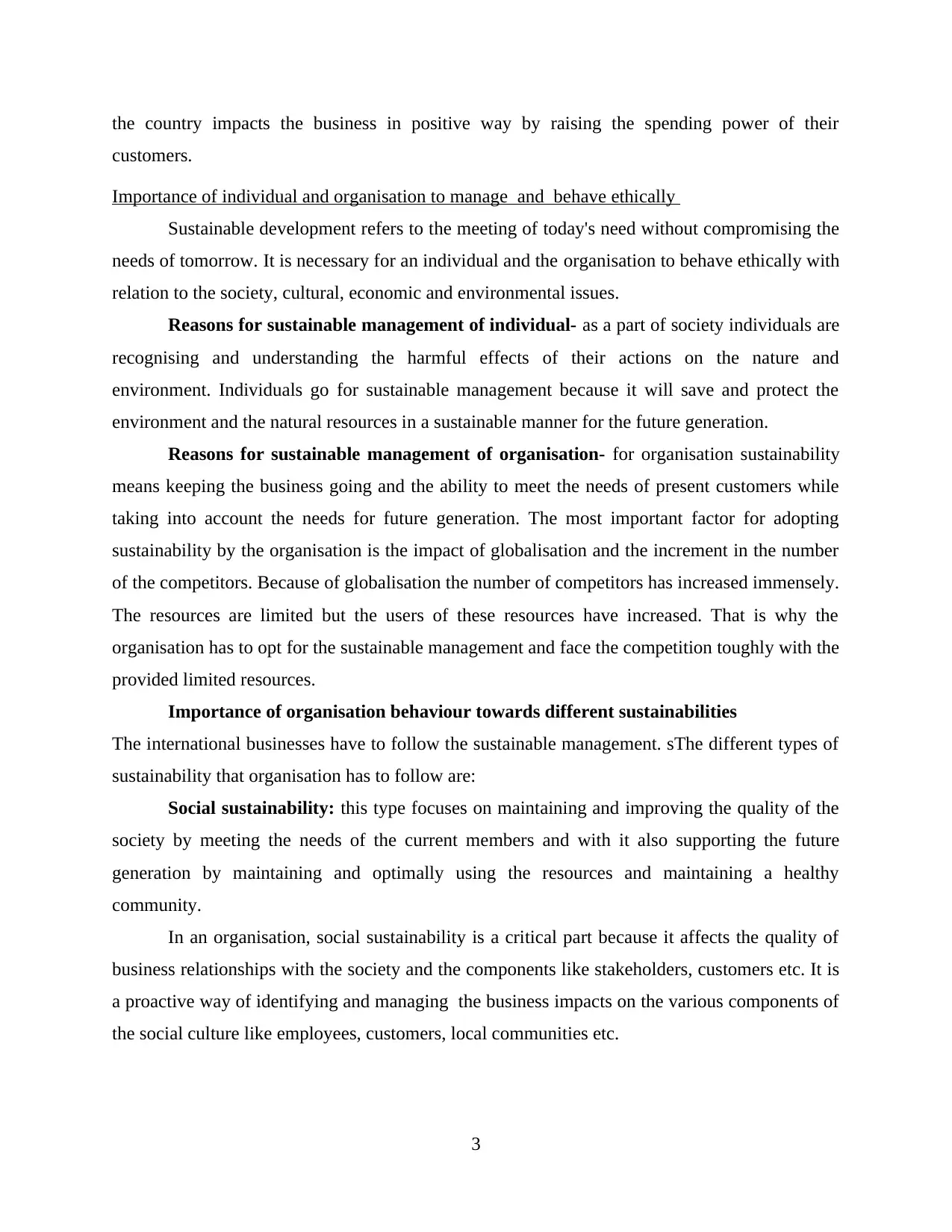
the country impacts the business in positive way by raising the spending power of their
customers.
Importance of individual and organisation to manage and behave ethically
Sustainable development refers to the meeting of today's need without compromising the
needs of tomorrow. It is necessary for an individual and the organisation to behave ethically with
relation to the society, cultural, economic and environmental issues.
Reasons for sustainable management of individual- as a part of society individuals are
recognising and understanding the harmful effects of their actions on the nature and
environment. Individuals go for sustainable management because it will save and protect the
environment and the natural resources in a sustainable manner for the future generation.
Reasons for sustainable management of organisation- for organisation sustainability
means keeping the business going and the ability to meet the needs of present customers while
taking into account the needs for future generation. The most important factor for adopting
sustainability by the organisation is the impact of globalisation and the increment in the number
of the competitors. Because of globalisation the number of competitors has increased immensely.
The resources are limited but the users of these resources have increased. That is why the
organisation has to opt for the sustainable management and face the competition toughly with the
provided limited resources.
Importance of organisation behaviour towards different sustainabilities
The international businesses have to follow the sustainable management. sThe different types of
sustainability that organisation has to follow are:
Social sustainability: this type focuses on maintaining and improving the quality of the
society by meeting the needs of the current members and with it also supporting the future
generation by maintaining and optimally using the resources and maintaining a healthy
community.
In an organisation, social sustainability is a critical part because it affects the quality of
business relationships with the society and the components like stakeholders, customers etc. It is
a proactive way of identifying and managing the business impacts on the various components of
the social culture like employees, customers, local communities etc.
3
customers.
Importance of individual and organisation to manage and behave ethically
Sustainable development refers to the meeting of today's need without compromising the
needs of tomorrow. It is necessary for an individual and the organisation to behave ethically with
relation to the society, cultural, economic and environmental issues.
Reasons for sustainable management of individual- as a part of society individuals are
recognising and understanding the harmful effects of their actions on the nature and
environment. Individuals go for sustainable management because it will save and protect the
environment and the natural resources in a sustainable manner for the future generation.
Reasons for sustainable management of organisation- for organisation sustainability
means keeping the business going and the ability to meet the needs of present customers while
taking into account the needs for future generation. The most important factor for adopting
sustainability by the organisation is the impact of globalisation and the increment in the number
of the competitors. Because of globalisation the number of competitors has increased immensely.
The resources are limited but the users of these resources have increased. That is why the
organisation has to opt for the sustainable management and face the competition toughly with the
provided limited resources.
Importance of organisation behaviour towards different sustainabilities
The international businesses have to follow the sustainable management. sThe different types of
sustainability that organisation has to follow are:
Social sustainability: this type focuses on maintaining and improving the quality of the
society by meeting the needs of the current members and with it also supporting the future
generation by maintaining and optimally using the resources and maintaining a healthy
community.
In an organisation, social sustainability is a critical part because it affects the quality of
business relationships with the society and the components like stakeholders, customers etc. It is
a proactive way of identifying and managing the business impacts on the various components of
the social culture like employees, customers, local communities etc.
3
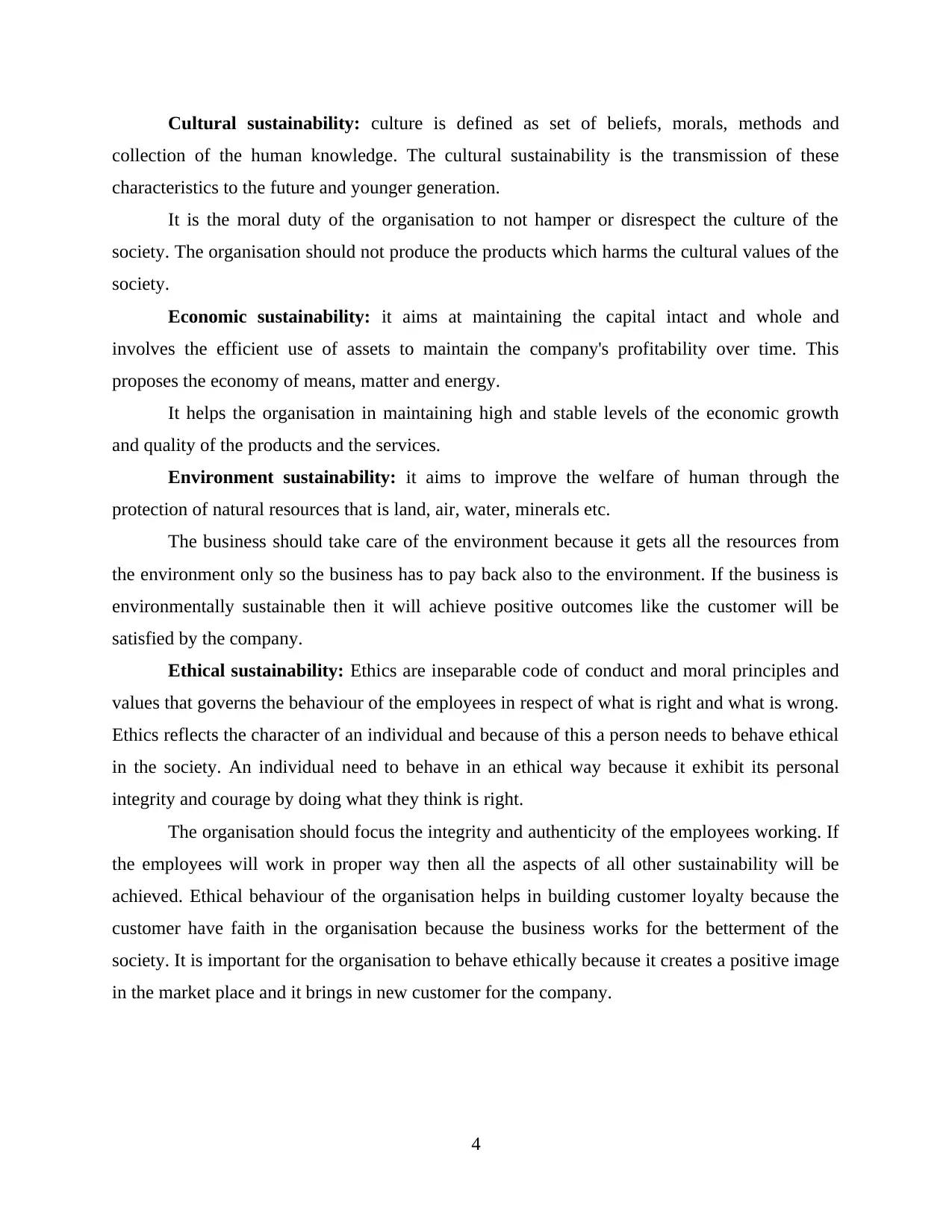
Cultural sustainability: culture is defined as set of beliefs, morals, methods and
collection of the human knowledge. The cultural sustainability is the transmission of these
characteristics to the future and younger generation.
It is the moral duty of the organisation to not hamper or disrespect the culture of the
society. The organisation should not produce the products which harms the cultural values of the
society.
Economic sustainability: it aims at maintaining the capital intact and whole and
involves the efficient use of assets to maintain the company's profitability over time. This
proposes the economy of means, matter and energy.
It helps the organisation in maintaining high and stable levels of the economic growth
and quality of the products and the services.
Environment sustainability: it aims to improve the welfare of human through the
protection of natural resources that is land, air, water, minerals etc.
The business should take care of the environment because it gets all the resources from
the environment only so the business has to pay back also to the environment. If the business is
environmentally sustainable then it will achieve positive outcomes like the customer will be
satisfied by the company.
Ethical sustainability: Ethics are inseparable code of conduct and moral principles and
values that governs the behaviour of the employees in respect of what is right and what is wrong.
Ethics reflects the character of an individual and because of this a person needs to behave ethical
in the society. An individual need to behave in an ethical way because it exhibit its personal
integrity and courage by doing what they think is right.
The organisation should focus the integrity and authenticity of the employees working. If
the employees will work in proper way then all the aspects of all other sustainability will be
achieved. Ethical behaviour of the organisation helps in building customer loyalty because the
customer have faith in the organisation because the business works for the betterment of the
society. It is important for the organisation to behave ethically because it creates a positive image
in the market place and it brings in new customer for the company.
4
collection of the human knowledge. The cultural sustainability is the transmission of these
characteristics to the future and younger generation.
It is the moral duty of the organisation to not hamper or disrespect the culture of the
society. The organisation should not produce the products which harms the cultural values of the
society.
Economic sustainability: it aims at maintaining the capital intact and whole and
involves the efficient use of assets to maintain the company's profitability over time. This
proposes the economy of means, matter and energy.
It helps the organisation in maintaining high and stable levels of the economic growth
and quality of the products and the services.
Environment sustainability: it aims to improve the welfare of human through the
protection of natural resources that is land, air, water, minerals etc.
The business should take care of the environment because it gets all the resources from
the environment only so the business has to pay back also to the environment. If the business is
environmentally sustainable then it will achieve positive outcomes like the customer will be
satisfied by the company.
Ethical sustainability: Ethics are inseparable code of conduct and moral principles and
values that governs the behaviour of the employees in respect of what is right and what is wrong.
Ethics reflects the character of an individual and because of this a person needs to behave ethical
in the society. An individual need to behave in an ethical way because it exhibit its personal
integrity and courage by doing what they think is right.
The organisation should focus the integrity and authenticity of the employees working. If
the employees will work in proper way then all the aspects of all other sustainability will be
achieved. Ethical behaviour of the organisation helps in building customer loyalty because the
customer have faith in the organisation because the business works for the betterment of the
society. It is important for the organisation to behave ethically because it creates a positive image
in the market place and it brings in new customer for the company.
4
⊘ This is a preview!⊘
Do you want full access?
Subscribe today to unlock all pages.

Trusted by 1+ million students worldwide
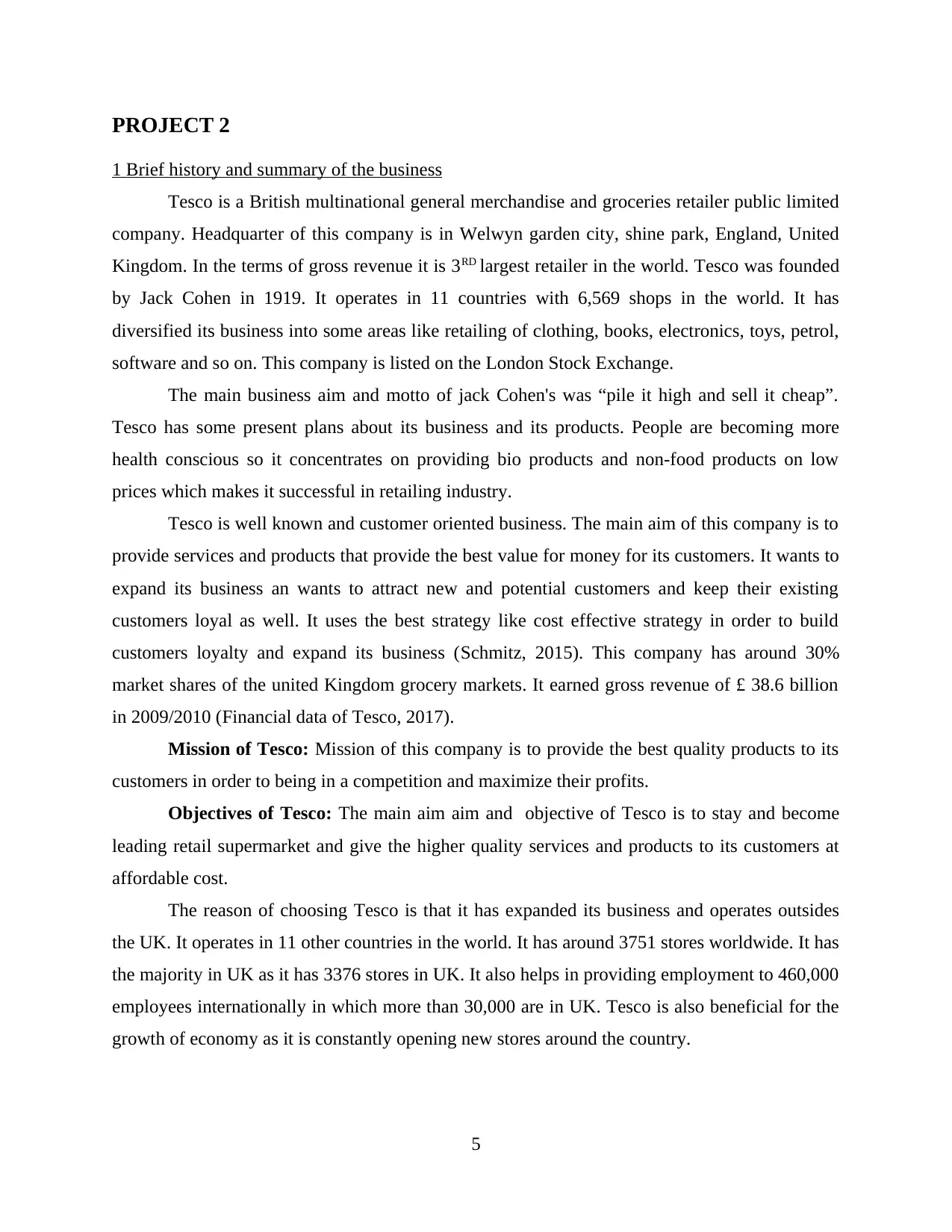
PROJECT 2
1 Brief history and summary of the business
Tesco is a British multinational general merchandise and groceries retailer public limited
company. Headquarter of this company is in Welwyn garden city, shine park, England, United
Kingdom. In the terms of gross revenue it is 3RD largest retailer in the world. Tesco was founded
by Jack Cohen in 1919. It operates in 11 countries with 6,569 shops in the world. It has
diversified its business into some areas like retailing of clothing, books, electronics, toys, petrol,
software and so on. This company is listed on the London Stock Exchange.
The main business aim and motto of jack Cohen's was “pile it high and sell it cheap”.
Tesco has some present plans about its business and its products. People are becoming more
health conscious so it concentrates on providing bio products and non-food products on low
prices which makes it successful in retailing industry.
Tesco is well known and customer oriented business. The main aim of this company is to
provide services and products that provide the best value for money for its customers. It wants to
expand its business an wants to attract new and potential customers and keep their existing
customers loyal as well. It uses the best strategy like cost effective strategy in order to build
customers loyalty and expand its business (Schmitz, 2015). This company has around 30%
market shares of the united Kingdom grocery markets. It earned gross revenue of £ 38.6 billion
in 2009/2010 (Financial data of Tesco, 2017).
Mission of Tesco: Mission of this company is to provide the best quality products to its
customers in order to being in a competition and maximize their profits.
Objectives of Tesco: The main aim aim and objective of Tesco is to stay and become
leading retail supermarket and give the higher quality services and products to its customers at
affordable cost.
The reason of choosing Tesco is that it has expanded its business and operates outsides
the UK. It operates in 11 other countries in the world. It has around 3751 stores worldwide. It has
the majority in UK as it has 3376 stores in UK. It also helps in providing employment to 460,000
employees internationally in which more than 30,000 are in UK. Tesco is also beneficial for the
growth of economy as it is constantly opening new stores around the country.
5
1 Brief history and summary of the business
Tesco is a British multinational general merchandise and groceries retailer public limited
company. Headquarter of this company is in Welwyn garden city, shine park, England, United
Kingdom. In the terms of gross revenue it is 3RD largest retailer in the world. Tesco was founded
by Jack Cohen in 1919. It operates in 11 countries with 6,569 shops in the world. It has
diversified its business into some areas like retailing of clothing, books, electronics, toys, petrol,
software and so on. This company is listed on the London Stock Exchange.
The main business aim and motto of jack Cohen's was “pile it high and sell it cheap”.
Tesco has some present plans about its business and its products. People are becoming more
health conscious so it concentrates on providing bio products and non-food products on low
prices which makes it successful in retailing industry.
Tesco is well known and customer oriented business. The main aim of this company is to
provide services and products that provide the best value for money for its customers. It wants to
expand its business an wants to attract new and potential customers and keep their existing
customers loyal as well. It uses the best strategy like cost effective strategy in order to build
customers loyalty and expand its business (Schmitz, 2015). This company has around 30%
market shares of the united Kingdom grocery markets. It earned gross revenue of £ 38.6 billion
in 2009/2010 (Financial data of Tesco, 2017).
Mission of Tesco: Mission of this company is to provide the best quality products to its
customers in order to being in a competition and maximize their profits.
Objectives of Tesco: The main aim aim and objective of Tesco is to stay and become
leading retail supermarket and give the higher quality services and products to its customers at
affordable cost.
The reason of choosing Tesco is that it has expanded its business and operates outsides
the UK. It operates in 11 other countries in the world. It has around 3751 stores worldwide. It has
the majority in UK as it has 3376 stores in UK. It also helps in providing employment to 460,000
employees internationally in which more than 30,000 are in UK. Tesco is also beneficial for the
growth of economy as it is constantly opening new stores around the country.
5
Paraphrase This Document
Need a fresh take? Get an instant paraphrase of this document with our AI Paraphraser
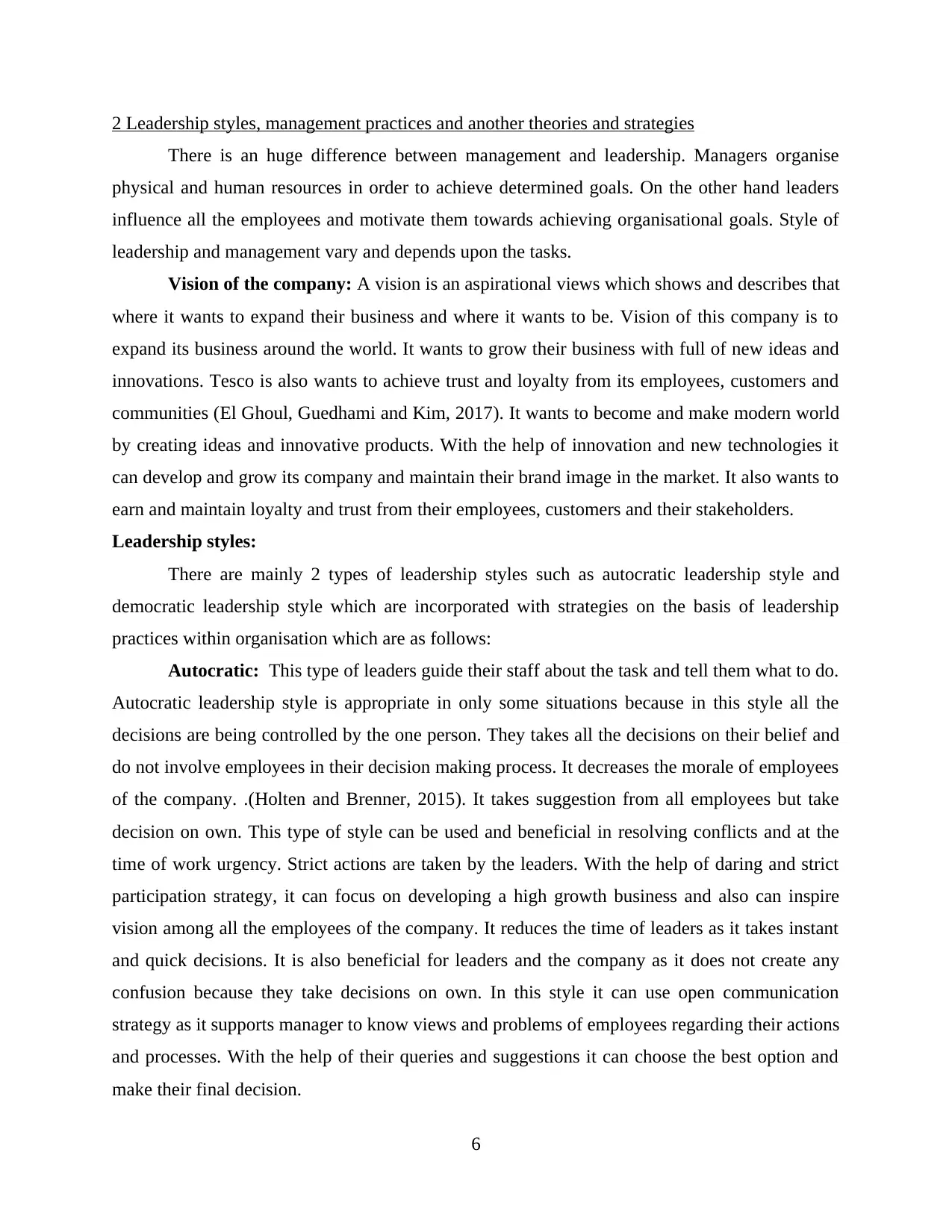
2 Leadership styles, management practices and another theories and strategies
There is an huge difference between management and leadership. Managers organise
physical and human resources in order to achieve determined goals. On the other hand leaders
influence all the employees and motivate them towards achieving organisational goals. Style of
leadership and management vary and depends upon the tasks.
Vision of the company: A vision is an aspirational views which shows and describes that
where it wants to expand their business and where it wants to be. Vision of this company is to
expand its business around the world. It wants to grow their business with full of new ideas and
innovations. Tesco is also wants to achieve trust and loyalty from its employees, customers and
communities (El Ghoul, Guedhami and Kim, 2017). It wants to become and make modern world
by creating ideas and innovative products. With the help of innovation and new technologies it
can develop and grow its company and maintain their brand image in the market. It also wants to
earn and maintain loyalty and trust from their employees, customers and their stakeholders.
Leadership styles:
There are mainly 2 types of leadership styles such as autocratic leadership style and
democratic leadership style which are incorporated with strategies on the basis of leadership
practices within organisation which are as follows:
Autocratic: This type of leaders guide their staff about the task and tell them what to do.
Autocratic leadership style is appropriate in only some situations because in this style all the
decisions are being controlled by the one person. They takes all the decisions on their belief and
do not involve employees in their decision making process. It decreases the morale of employees
of the company. .(Holten and Brenner, 2015). It takes suggestion from all employees but take
decision on own. This type of style can be used and beneficial in resolving conflicts and at the
time of work urgency. Strict actions are taken by the leaders. With the help of daring and strict
participation strategy, it can focus on developing a high growth business and also can inspire
vision among all the employees of the company. It reduces the time of leaders as it takes instant
and quick decisions. It is also beneficial for leaders and the company as it does not create any
confusion because they take decisions on own. In this style it can use open communication
strategy as it supports manager to know views and problems of employees regarding their actions
and processes. With the help of their queries and suggestions it can choose the best option and
make their final decision.
6
There is an huge difference between management and leadership. Managers organise
physical and human resources in order to achieve determined goals. On the other hand leaders
influence all the employees and motivate them towards achieving organisational goals. Style of
leadership and management vary and depends upon the tasks.
Vision of the company: A vision is an aspirational views which shows and describes that
where it wants to expand their business and where it wants to be. Vision of this company is to
expand its business around the world. It wants to grow their business with full of new ideas and
innovations. Tesco is also wants to achieve trust and loyalty from its employees, customers and
communities (El Ghoul, Guedhami and Kim, 2017). It wants to become and make modern world
by creating ideas and innovative products. With the help of innovation and new technologies it
can develop and grow its company and maintain their brand image in the market. It also wants to
earn and maintain loyalty and trust from their employees, customers and their stakeholders.
Leadership styles:
There are mainly 2 types of leadership styles such as autocratic leadership style and
democratic leadership style which are incorporated with strategies on the basis of leadership
practices within organisation which are as follows:
Autocratic: This type of leaders guide their staff about the task and tell them what to do.
Autocratic leadership style is appropriate in only some situations because in this style all the
decisions are being controlled by the one person. They takes all the decisions on their belief and
do not involve employees in their decision making process. It decreases the morale of employees
of the company. .(Holten and Brenner, 2015). It takes suggestion from all employees but take
decision on own. This type of style can be used and beneficial in resolving conflicts and at the
time of work urgency. Strict actions are taken by the leaders. With the help of daring and strict
participation strategy, it can focus on developing a high growth business and also can inspire
vision among all the employees of the company. It reduces the time of leaders as it takes instant
and quick decisions. It is also beneficial for leaders and the company as it does not create any
confusion because they take decisions on own. In this style it can use open communication
strategy as it supports manager to know views and problems of employees regarding their actions
and processes. With the help of their queries and suggestions it can choose the best option and
make their final decision.
6
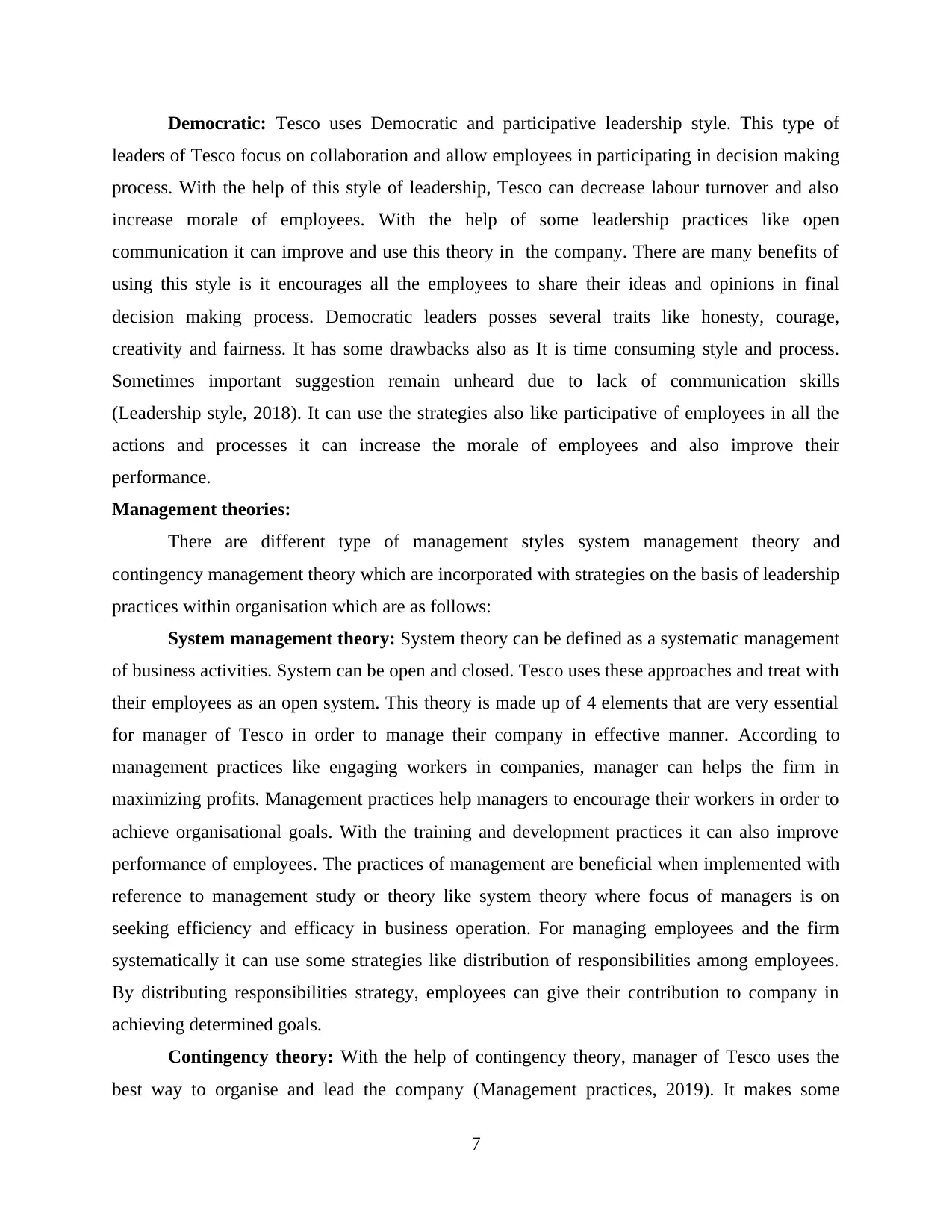
Democratic: Tesco uses Democratic and participative leadership style. This type of
leaders of Tesco focus on collaboration and allow employees in participating in decision making
process. With the help of this style of leadership, Tesco can decrease labour turnover and also
increase morale of employees. With the help of some leadership practices like open
communication it can improve and use this theory in the company. There are many benefits of
using this style is it encourages all the employees to share their ideas and opinions in final
decision making process. Democratic leaders posses several traits like honesty, courage,
creativity and fairness. It has some drawbacks also as It is time consuming style and process.
Sometimes important suggestion remain unheard due to lack of communication skills
(Leadership style, 2018). It can use the strategies also like participative of employees in all the
actions and processes it can increase the morale of employees and also improve their
performance.
Management theories:
There are different type of management styles system management theory and
contingency management theory which are incorporated with strategies on the basis of leadership
practices within organisation which are as follows:
System management theory: System theory can be defined as a systematic management
of business activities. System can be open and closed. Tesco uses these approaches and treat with
their employees as an open system. This theory is made up of 4 elements that are very essential
for manager of Tesco in order to manage their company in effective manner. According to
management practices like engaging workers in companies, manager can helps the firm in
maximizing profits. Management practices help managers to encourage their workers in order to
achieve organisational goals. With the training and development practices it can also improve
performance of employees. The practices of management are beneficial when implemented with
reference to management study or theory like system theory where focus of managers is on
seeking efficiency and efficacy in business operation. For managing employees and the firm
systematically it can use some strategies like distribution of responsibilities among employees.
By distributing responsibilities strategy, employees can give their contribution to company in
achieving determined goals.
Contingency theory: With the help of contingency theory, manager of Tesco uses the
best way to organise and lead the company (Management practices, 2019). It makes some
7
leaders of Tesco focus on collaboration and allow employees in participating in decision making
process. With the help of this style of leadership, Tesco can decrease labour turnover and also
increase morale of employees. With the help of some leadership practices like open
communication it can improve and use this theory in the company. There are many benefits of
using this style is it encourages all the employees to share their ideas and opinions in final
decision making process. Democratic leaders posses several traits like honesty, courage,
creativity and fairness. It has some drawbacks also as It is time consuming style and process.
Sometimes important suggestion remain unheard due to lack of communication skills
(Leadership style, 2018). It can use the strategies also like participative of employees in all the
actions and processes it can increase the morale of employees and also improve their
performance.
Management theories:
There are different type of management styles system management theory and
contingency management theory which are incorporated with strategies on the basis of leadership
practices within organisation which are as follows:
System management theory: System theory can be defined as a systematic management
of business activities. System can be open and closed. Tesco uses these approaches and treat with
their employees as an open system. This theory is made up of 4 elements that are very essential
for manager of Tesco in order to manage their company in effective manner. According to
management practices like engaging workers in companies, manager can helps the firm in
maximizing profits. Management practices help managers to encourage their workers in order to
achieve organisational goals. With the training and development practices it can also improve
performance of employees. The practices of management are beneficial when implemented with
reference to management study or theory like system theory where focus of managers is on
seeking efficiency and efficacy in business operation. For managing employees and the firm
systematically it can use some strategies like distribution of responsibilities among employees.
By distributing responsibilities strategy, employees can give their contribution to company in
achieving determined goals.
Contingency theory: With the help of contingency theory, manager of Tesco uses the
best way to organise and lead the company (Management practices, 2019). It makes some
7
⊘ This is a preview!⊘
Do you want full access?
Subscribe today to unlock all pages.

Trusted by 1+ million students worldwide
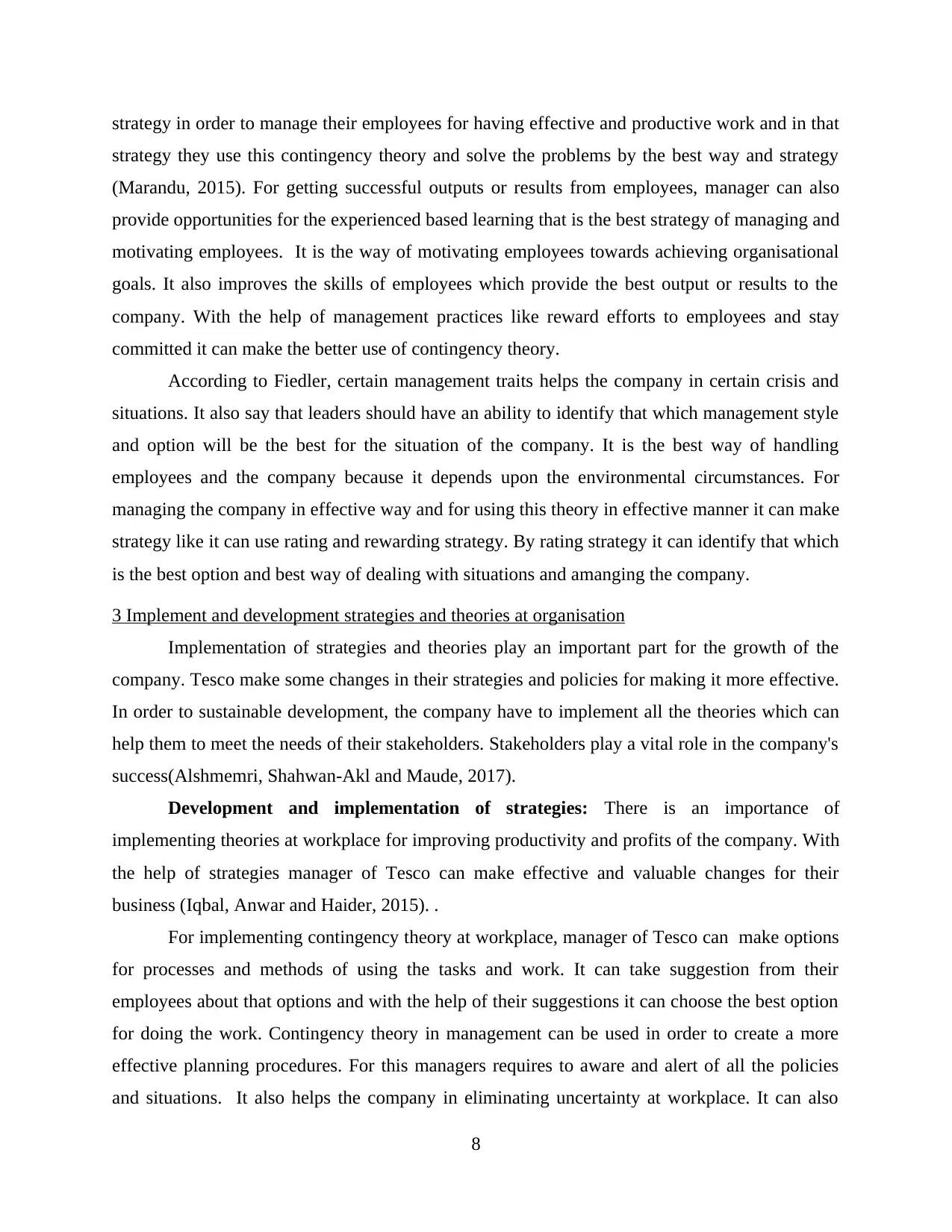
strategy in order to manage their employees for having effective and productive work and in that
strategy they use this contingency theory and solve the problems by the best way and strategy
(Marandu, 2015). For getting successful outputs or results from employees, manager can also
provide opportunities for the experienced based learning that is the best strategy of managing and
motivating employees. It is the way of motivating employees towards achieving organisational
goals. It also improves the skills of employees which provide the best output or results to the
company. With the help of management practices like reward efforts to employees and stay
committed it can make the better use of contingency theory.
According to Fiedler, certain management traits helps the company in certain crisis and
situations. It also say that leaders should have an ability to identify that which management style
and option will be the best for the situation of the company. It is the best way of handling
employees and the company because it depends upon the environmental circumstances. For
managing the company in effective way and for using this theory in effective manner it can make
strategy like it can use rating and rewarding strategy. By rating strategy it can identify that which
is the best option and best way of dealing with situations and amanging the company.
3 Implement and development strategies and theories at organisation
Implementation of strategies and theories play an important part for the growth of the
company. Tesco make some changes in their strategies and policies for making it more effective.
In order to sustainable development, the company have to implement all the theories which can
help them to meet the needs of their stakeholders. Stakeholders play a vital role in the company's
success(Alshmemri, Shahwan-Akl and Maude, 2017).
Development and implementation of strategies: There is an importance of
implementing theories at workplace for improving productivity and profits of the company. With
the help of strategies manager of Tesco can make effective and valuable changes for their
business (Iqbal, Anwar and Haider, 2015). .
For implementing contingency theory at workplace, manager of Tesco can make options
for processes and methods of using the tasks and work. It can take suggestion from their
employees about that options and with the help of their suggestions it can choose the best option
for doing the work. Contingency theory in management can be used in order to create a more
effective planning procedures. For this managers requires to aware and alert of all the policies
and situations. It also helps the company in eliminating uncertainty at workplace. It can also
8
strategy they use this contingency theory and solve the problems by the best way and strategy
(Marandu, 2015). For getting successful outputs or results from employees, manager can also
provide opportunities for the experienced based learning that is the best strategy of managing and
motivating employees. It is the way of motivating employees towards achieving organisational
goals. It also improves the skills of employees which provide the best output or results to the
company. With the help of management practices like reward efforts to employees and stay
committed it can make the better use of contingency theory.
According to Fiedler, certain management traits helps the company in certain crisis and
situations. It also say that leaders should have an ability to identify that which management style
and option will be the best for the situation of the company. It is the best way of handling
employees and the company because it depends upon the environmental circumstances. For
managing the company in effective way and for using this theory in effective manner it can make
strategy like it can use rating and rewarding strategy. By rating strategy it can identify that which
is the best option and best way of dealing with situations and amanging the company.
3 Implement and development strategies and theories at organisation
Implementation of strategies and theories play an important part for the growth of the
company. Tesco make some changes in their strategies and policies for making it more effective.
In order to sustainable development, the company have to implement all the theories which can
help them to meet the needs of their stakeholders. Stakeholders play a vital role in the company's
success(Alshmemri, Shahwan-Akl and Maude, 2017).
Development and implementation of strategies: There is an importance of
implementing theories at workplace for improving productivity and profits of the company. With
the help of strategies manager of Tesco can make effective and valuable changes for their
business (Iqbal, Anwar and Haider, 2015). .
For implementing contingency theory at workplace, manager of Tesco can make options
for processes and methods of using the tasks and work. It can take suggestion from their
employees about that options and with the help of their suggestions it can choose the best option
for doing the work. Contingency theory in management can be used in order to create a more
effective planning procedures. For this managers requires to aware and alert of all the policies
and situations. It also helps the company in eliminating uncertainty at workplace. It can also
8
Paraphrase This Document
Need a fresh take? Get an instant paraphrase of this document with our AI Paraphraser
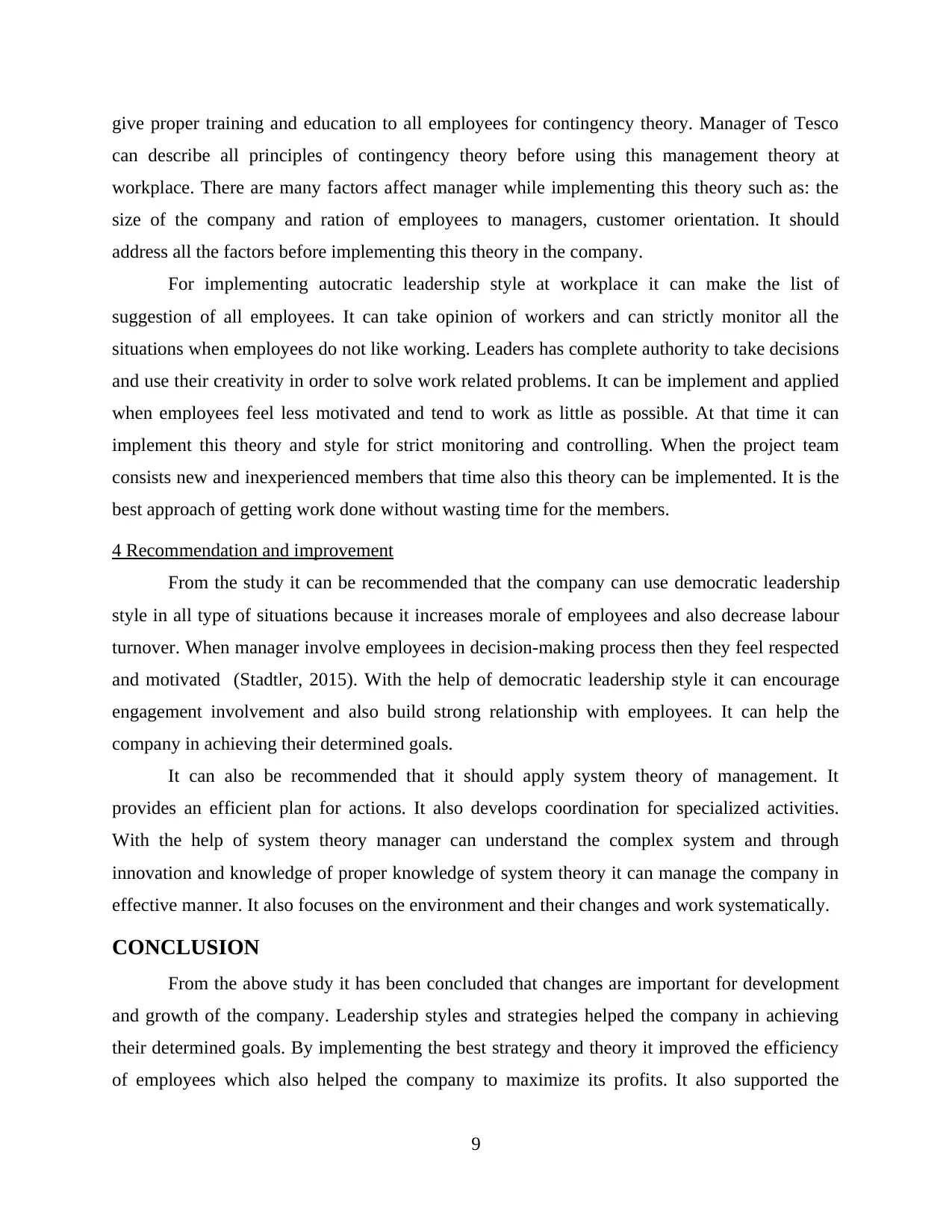
give proper training and education to all employees for contingency theory. Manager of Tesco
can describe all principles of contingency theory before using this management theory at
workplace. There are many factors affect manager while implementing this theory such as: the
size of the company and ration of employees to managers, customer orientation. It should
address all the factors before implementing this theory in the company.
For implementing autocratic leadership style at workplace it can make the list of
suggestion of all employees. It can take opinion of workers and can strictly monitor all the
situations when employees do not like working. Leaders has complete authority to take decisions
and use their creativity in order to solve work related problems. It can be implement and applied
when employees feel less motivated and tend to work as little as possible. At that time it can
implement this theory and style for strict monitoring and controlling. When the project team
consists new and inexperienced members that time also this theory can be implemented. It is the
best approach of getting work done without wasting time for the members.
4 Recommendation and improvement
From the study it can be recommended that the company can use democratic leadership
style in all type of situations because it increases morale of employees and also decrease labour
turnover. When manager involve employees in decision-making process then they feel respected
and motivated (Stadtler, 2015). With the help of democratic leadership style it can encourage
engagement involvement and also build strong relationship with employees. It can help the
company in achieving their determined goals.
It can also be recommended that it should apply system theory of management. It
provides an efficient plan for actions. It also develops coordination for specialized activities.
With the help of system theory manager can understand the complex system and through
innovation and knowledge of proper knowledge of system theory it can manage the company in
effective manner. It also focuses on the environment and their changes and work systematically.
CONCLUSION
From the above study it has been concluded that changes are important for development
and growth of the company. Leadership styles and strategies helped the company in achieving
their determined goals. By implementing the best strategy and theory it improved the efficiency
of employees which also helped the company to maximize its profits. It also supported the
9
can describe all principles of contingency theory before using this management theory at
workplace. There are many factors affect manager while implementing this theory such as: the
size of the company and ration of employees to managers, customer orientation. It should
address all the factors before implementing this theory in the company.
For implementing autocratic leadership style at workplace it can make the list of
suggestion of all employees. It can take opinion of workers and can strictly monitor all the
situations when employees do not like working. Leaders has complete authority to take decisions
and use their creativity in order to solve work related problems. It can be implement and applied
when employees feel less motivated and tend to work as little as possible. At that time it can
implement this theory and style for strict monitoring and controlling. When the project team
consists new and inexperienced members that time also this theory can be implemented. It is the
best approach of getting work done without wasting time for the members.
4 Recommendation and improvement
From the study it can be recommended that the company can use democratic leadership
style in all type of situations because it increases morale of employees and also decrease labour
turnover. When manager involve employees in decision-making process then they feel respected
and motivated (Stadtler, 2015). With the help of democratic leadership style it can encourage
engagement involvement and also build strong relationship with employees. It can help the
company in achieving their determined goals.
It can also be recommended that it should apply system theory of management. It
provides an efficient plan for actions. It also develops coordination for specialized activities.
With the help of system theory manager can understand the complex system and through
innovation and knowledge of proper knowledge of system theory it can manage the company in
effective manner. It also focuses on the environment and their changes and work systematically.
CONCLUSION
From the above study it has been concluded that changes are important for development
and growth of the company. Leadership styles and strategies helped the company in achieving
their determined goals. By implementing the best strategy and theory it improved the efficiency
of employees which also helped the company to maximize its profits. It also supported the
9
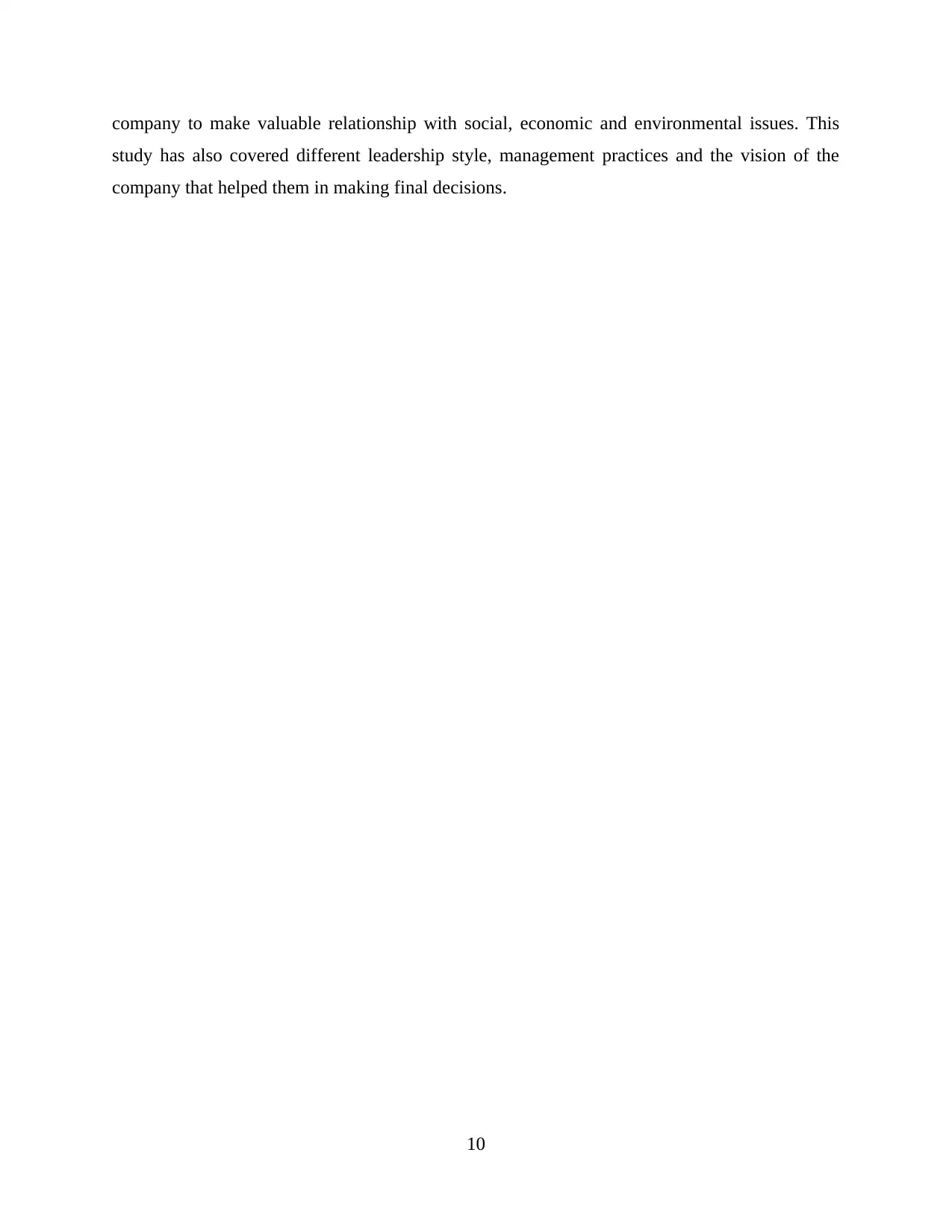
company to make valuable relationship with social, economic and environmental issues. This
study has also covered different leadership style, management practices and the vision of the
company that helped them in making final decisions.
10
study has also covered different leadership style, management practices and the vision of the
company that helped them in making final decisions.
10
⊘ This is a preview!⊘
Do you want full access?
Subscribe today to unlock all pages.

Trusted by 1+ million students worldwide
1 out of 13
Related Documents
Your All-in-One AI-Powered Toolkit for Academic Success.
+13062052269
info@desklib.com
Available 24*7 on WhatsApp / Email
![[object Object]](/_next/static/media/star-bottom.7253800d.svg)
Unlock your academic potential
Copyright © 2020–2026 A2Z Services. All Rights Reserved. Developed and managed by ZUCOL.





